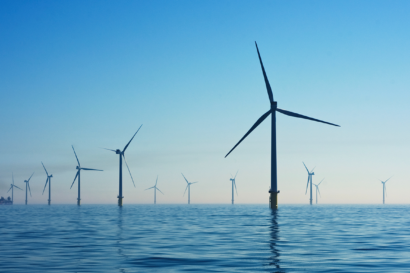PRESS RELEASES | 26/04/2023
Access to low-cost green electricity vital to the future of UK heavy industry

Today, the Aldersgate Group launches a new report [1] with University College London (UCL) that outlines the policy measures required to deliver a decarbonised power system and support the electrification of heavy industrial sectors such as steel, cement, glass and chemicals. Coming shortly after the Government’s energy security and net zero announcements, the report’s findings are based on extensive engagement with businesses across the UK’s heavy industrial and power sectors.
To decarbonise power and end industry’s reliance on costly fossil fuels, the UK must install around 200GW of low carbon energy infrastructure in the next 12 years [2]. At the same time, UK heavy industry will need to increasingly run on clean and affordable electricity in order to rapidly decarbonise and remain competitive. However, the current pace of policy delivery does not meet the scale of this challenge. This report recommends a range of measures to address this.
The report outlines 15 measures to upgrade the power grid, facilitate continued investment in renewables, enable direct access to low-cost renewable power for heavy industry, accelerate low carbon innovation and support the competitiveness of UK industry.
To reach net zero by 2050, UK industrial emissions must fall by 70% by 2035 and 90% by 2040 [3]. In many heavy industrial sectors, electrifying manufacturing processes that currently rely on fossil fuels is key to this. Clean electricity also has an important role to play to support other processes such as hydrogen production and the operation of carbon capture and storage. In both cases, access to high volumes of low carbon and affordable electricity will be vital to the successful decarbonisation of heavy industries and their ability to be competitive in the global transition to net zero emissions.
1. Decarbonising the power sector by 2035
This new report calls for a range of measures including reforms to the grid connection process to cut waiting times that are currently up to 13 years, a streamlined planning process to fast track low-carbon and network infrastructure projects, treating the construction of grid infrastructure as a ‘national endeavour’ to boost domestic supply chains, and adjustments to the successful Contracts for Difference (CfD) scheme to support greater locational diversity and improve operational signals.
Phil McNally, Research Fellow & Electricity Markets Expert, UCL, said: “Reaching the government’s target of a decarbonised power system by 2035 will require accelerating low-carbon infrastructure deployment to around 3 to 4 times the current rate. Such a step-change is wishful thinking unless government moves urgently to remove longstanding barriers to deployment such as grid connections and the planning and consents system. This report offers six recommendations that government should follow to keep the 2035 goal alive.
2. Accelerating the electrification of heavy industries
The report calls for market reforms that will provide heavy industries with direct access to growing volumes of low-cost, low-carbon power. Key measures include creating a Green Power Pool that would provide industries such as steel with direct access to renewable power, supporting the growth of a standardised zero carbon Power Purchase Agreement market to facilitate contracts between heavy industries and renewable generators, and taking a cautious approach to shifting policy costs away from electricity bills and towards gas bills.
Prof Michael Grubb, Professor of Energy and Climate Change at the UCL Institute for Sustainable Resources, said: “Faced with the threat to thousands of jobs if the UK’s struggling blast furnaces close, and the risk of enduring import dependencies on foreign steel, the government has offered co-investment to help the UK’s steel industry convert to low carbon production – which requires a lot of electricity. Expecting these companies to co-invest the needed £billions is only credible if the government also maps out a direct route for them to access the cheap and clean electricity that offshore wind can now provide.”
3. Supporting the competitiveness of heavy industries
To ensure that UK producers can remain competitive internationally and shift to low carbon production, the report calls for a bold funding package for industrial decarbonisation to stimulate private co-investment. It also advocates for measures that will grow the demand for low carbon industrial products and provide a level playing field for domestic low carbon industries. These include the introduction of mandatory product standards, green public procurement rules and a carbon border adjustment mechanism (as outlined in previous Aldersgate Group reports [4]).
Laith Whitwham, Senior Policy Officer at the Aldersgate Group, said: “Decarbonising industrial processes might be a significant challenge, but it’s one that offers UK sectors like steel, cement and chemicals the opportunity to compete in new, quickly growing markets for greener goods. That means new jobs, growth, levelling up, and exports. This is at a time when UK businesses are already struggling to compete with high carbon industrial products from the likes of China and India. To make the move, low carbon electricity is key. This report outlines the policies needed to decarbonise the UK’s electricity supply, and accelerate the roll out of the new industrial infrastructure through which it will flow.”
Martin Casey, Director Communications, Public Affairs & Social Impact at CEMEX EMEA, said: “The decarbonisation of heavy industries such as cement and concrete is essential for the UK’s net zero ambitions. The recommendations in this report will accelerate electrification where it is possible, freeing up valuable low carbon fuels, such as hydrogen, for other parts of the economy that cannot electrify. With countries around the world racing to establish low carbon industries, the coordinated response suggested by this paper will be crucial to ensuring that UK businesses can prosper as they reduce their emissions.”
Jeffrey Kabel, Chief Transformation Officer, LIBERTY Steel group said: “The UK has an opportunity to gain competitive advantage, while pursuing its net zero ambitions, maintaining strategic industries and securing resilience in its supply chains. That competitive advantage will be in low carbon industrial production and products and will be reliant on low cost and low carbon energy, the incentivisation of private co-investment and the super-charging of demand for low carbon products in both public and private markets.
“Industries like steel and aluminium are also critical for energy transition – as foundation materials for technologies, transmission and storage such as wind turbines, new nuclear build, hydrogen pipelines and electric car batteries and infrastructure – creating a circularity of dependence in achieving net zero ambitions, energy security and domestic supply chain resilience.
“This new report from the Aldersgate Group and UCL sets out clear and comprehensive thinking which, if actioned, can support competitiveness, secure economic benefits and further boost the UK’s global leadership on decarbonisation.”
Niki Kesharaju, Future Markets Manager for Heat Decarbonisation at National Grid, said: “Decarbonising energy intensive industrial processes will be crucial to ensure the UK meets its net zero targets, and the recommendations in this report set out ambitious action to help drive progress.
“Today we’re investing in the biggest upgrade of the grid in a generation, which will help enable industry to electrify and decarbonise. We’re also pushing for the regulatory reform needed to allow us to make earlier decisions on network investment, supporting progress to a clean, affordable energy system for all.”
Steve Scrimshaw, VP of Siemens Energy UK&I, said: “We urgently need to pick up the pace if we are to meet the UK Government’s ambitious energy security targets. That means increased collaboration; it needs to be a national endeavour. This report clearly highlights the support needed if we are to achieve the decarbonisation of the power sector by 2035. The changing demands on the national transmission system are immense. National Grid needs to deliver five times as much in the next seven years as in the last 40.
“The UK is not alone in requiring additional electricity infrastructure and extended lead times for critical equipment are already reported. Global capacity will focus on countries where it is easier to do business. In the UK, we need to see a reduction in complexity and much faster implementation.”
RECOMMENDATIONS
1. Accelerate reforms to the grid connection process to significantly cut connection waiting times and prioritise projects that are ready to deploy. As part of this, ensure industrial network connections/upgrades are included.
2. Include a commitment in the promised action plan on accelerating network development to further develop the regulatory RIIO1 Framework to enhance anticipatory investment in network capacity.
3. Treat construction of the necessary grid infrastructure as a national endeavour, requiring collaboration with supply chains to make best use of scarce resources.
4. Streamline the planning process for low-carbon and network infrastructure by installing a presumption in favour of net-zero aligned projects, creating a priority fast-track for significant projects, and scaling up personnel at national and local level to manage the increased demand on these bodies.
5. Extend the Contracts for Difference (CfD) scheme while developing it to support greater locational diversity (e.g., through some weighting / differentiation by zones) and exploring incremental reforms to improve operational signals.
6. Continue to explore the REMA2 option of transitioning to a dual-market approach, creating a Green Power Pool alongside the wholesale market to allow consumers to directly access reliable and increasingly cheap renewable electricity.
7. A bold support fund for industrial decarbonisation is required to secure private co-investment in innovation and deployment of new low carbon production technologies at the scale required.
8. We welcome the commitment from government to ‘rebalance’ electricity and gas prices, shifting policy costs currently levied on electricity bills to gas bills in order to incentivise investment in electrification. However, this change should be implemented as part of the broader policy framework that makes electrification more technologically and economically accessible to heavy industries, along with targeted, time-limited exemptions for industries without viable electrification options.
9. Government should consider both expanding existing exemptions from policy and carbon costs across Energy Intensive Industries and introducing a new exemption for capacity market costs.
10. Explore the possibility of facilitating industrial access to cheap, predictably priced low-carbon electricity via Green Power Pool(s).
11. Consider the case for targeting electricity from the currently limited volume of a CfD-derived renewables pool to include steel production, as an integral part of a transition support package.
12. Explore options to enhance the PPA market, including mitigating the risk of off-taker payment default, for example by developing standardised, tradeable PPA contracts, or offering state guarantees.
13. Set out plans for the introduction of mandatory product standards, in line with the recommendations from a recent report by Frontier Economics and the Aldersgate Group,3 to enhance demand for low-carbon products and ensure a level playing field.
14. To support this, an ambitious Green Public Procurement Strategy would provide a strong market signal to industry and help kick-start the market for low-carbon products.
15. Review the UK Emissions Trading System so as to chart a path from the current structure of compensation and free allowances, towards a system compatible with the EU CBAM, and interactions with mandatory product standards.
—REFERENCES—
[1] Aldersgate Group and UCL ISR, A zero-carbon power grid and the electrification of heavy industry: how to deliver on a twin challenge (2023)
[2] (National Grid ESO, 2022a) as referenced in Aldersgate Group and UCL ISR, A zero-carbon power grid and the electrification of heavy industry: how to deliver on a twin challenge (2023)
[3] Climate Change Committee, Sixth Carbon Budget (2020)
[4] Aldersgate Group and Frontier Economics, How Product Standards Can Grow The Market For Low Carbon Industrial Products (2022)


